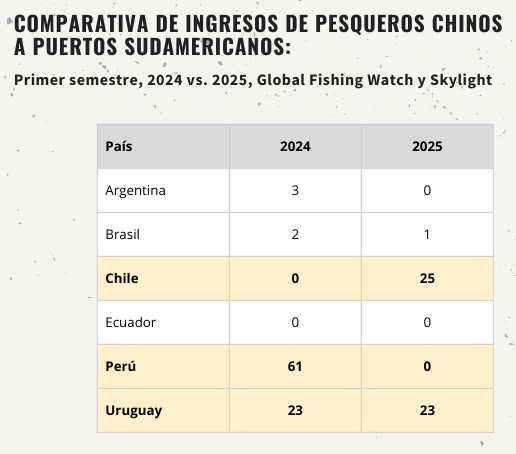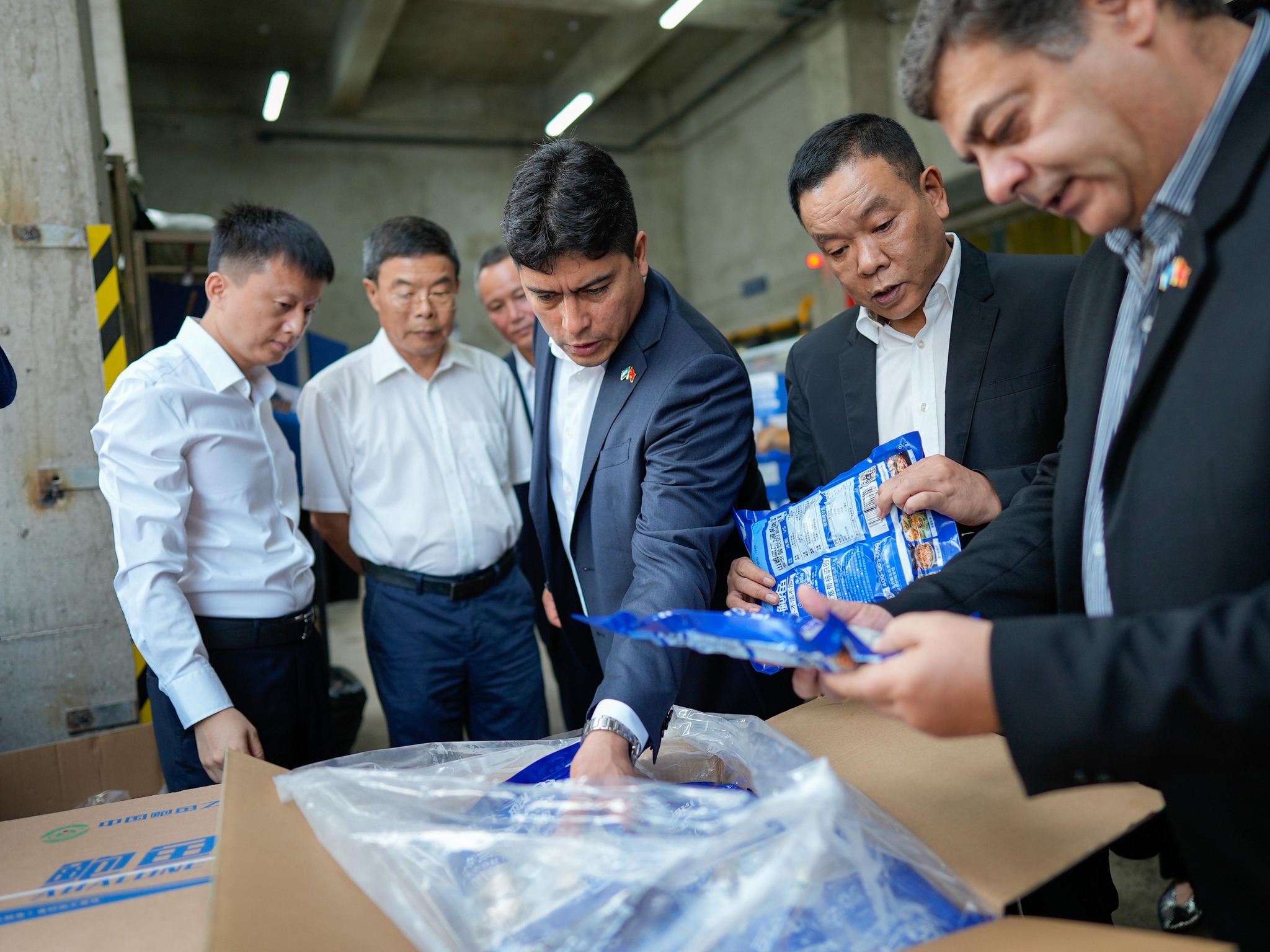An article from the Escenario Mundial website warns that "Chile has become the new logistics hub for China's distant-water fishing fleet, in a geopolitical shift that poses serious environmental, economic, and diplomatic implications for South America." This comes as reports of illegal fishing in Argentina's Exclusive Economic Zone (EEZ) and other areas of the Southwest Atlantic are increasing.
The research, conducted by the Environmental Policy Circle , documents that: “With up to 600 vessels operating simultaneously off the coast of South America, China’s distant water fishing fleet dominates the world’s seas.”
The report alleges that this fishing fleet is subsidized with millions of dollars by the Chinese government , and on more than one occasion, its vessels have been linked to multiple irregularities: labor rights violations, forced labor, physical violence against crews, deaths on board, and illegal captures of endangered species. Added to all this is a complex network of reefers (refrigerated vessels) and tankers that complement the operation, hindering traceability and facilitating the trade of unregulated fish.
For years, ports such as El Callao (Peru) and Montevideo (Uruguay) were key hubs for the Chinese fleet. However, "following a tightening of Peruvian controls in 2018 due to illegal incursions, access for these ships was drastically reduced. The reimposition of strict regulations in 2024 virtually sealed their exclusion from Peru. In parallel, Chilean ports such as Arica and Iquique registered an unprecedented increase: from 0 entries in 2023 to 25 in 2024, while Peru went from 61 to 0," highlighted Escenario Mundial .

This shift creates a paradox: Chile, which has ratified the High Seas Treaty (BBNJ) and aspires to host its Secretariat, now facilitates the supply, maintenance, and unloading of a fleet accused of depredating marine ecosystems.
What Chile is doing, by becoming the new logistical hub for the Chinese fishing fleet, is contributing to the plundering of fisheries on the margins and even within Argentina's EEZ . To this we must add Uruguay's historic cooperation for more than two decades not only with the Chinese fishing fleet, but also with the Spanish fishing fleet, mainly composed of Galician vessels, and the South Korean fleet. A fact that could not be ignored even by Infobae , which a few days ago published an article on the subject stating that: "In Uruguay, the port of Montevideo has been identified as one of the most used by the IUU fleet (the acronym stands for Illegal, Unreported, Unregulated fishing) due to the lack of systematic controls, especially between 2021 and 2023."
Along the same lines, a few years ago, another Clarín article stated: "For years, according to the Uruguayan fishing authority (DINARA), the port of Montevideo has been experiencing approximately 1,500 annual unloadings from vessels operating in the South Atlantic, the third most overfished geographical area in the world according to the FAO. Unloadings are also recorded from the Malvinas and, on occasion, even from vessels flying the illegal colonial flag."
Meanwhile, consistent with this new predatory turn of events, the government of the province of Santa Cruz, headed by Claudio Vidal , negotiated at the end of last year with “Hongdong Fisheries Co. Ltd., a Chinese company based in Fuzhou, an investment agreement with the government of the province,” reported Noticias Puerto Santa Cruz , adding that: “The agreement includes improvements in the five provincial ports, the construction of shipyards and the development of new fishing plants.”

It's clear, except for the short-term policies of governments, that these types of agreements threaten natural resources, Argentina's economic interests, and national sovereignty. These agreements and policies are sustained by that "federal consensus and cry with a toupee," which Vidal supports alongside other "wigged governors" such as Ignacio Torres of Chubut; Maximiliano Pullaro of Santa Fe; Martín Llaryora of Córdoba; and Carlos Sadir of Jujuy, who boast of having made "the necessary adjustments to achieve fiscal balance in the Nation and the Provinces."
"If the gringo who buys from us is bad, the criollo who sells to us is even worse ," Arturo Jauretche used to say. And in Argentina, the paradigm of dependency diversification has no shortage of representatives and defenders; in fact, it has too many .
Finally, the Environmental Policy Circle report states that: “To sustain this massive operation, the fleet relies on regional ports to provide logistical support: unloading of unregulated fish, repairs, refueling, and crew changes.”
The presence of these vessels, whether in Peruvian, Chilean, or Uruguayan ports, has a direct and negative impact on the competitiveness of our national fishing industry: while local fishermen comply with strict labor and environmental regulations, the foreign fleet operates at subsidized costs and without the same controls .
Sources:






